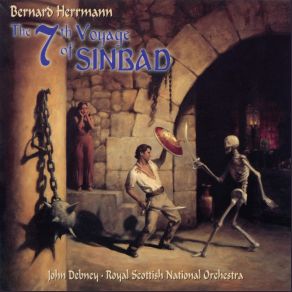The 7th Voyage of Sinbad
Download links and information about The 7th Voyage of Sinbad by Bernard Herrmann. This album was released in 1998 and it belongs to Theatre/Soundtrack genres. It contains 37 tracks with total duration of 58:30 minutes.

|
|
|---|---|
| Artist: | Bernard Herrmann |
| Release date: | 1998 |
| Genre: | Theatre/Soundtrack |
| Tracks: | 37 |
| Duration: | 58:30 |
| Buy it NOW at: | |
| Buy on iTunes $9.99 | |
| Buy on iTunes $9.99 | |
Tracks
[Edit]| No. | Title | Length |
|---|---|---|
| 1. | Overture | 2:07 |
| 2. | The Fog | 2:24 |
| 3. | The Princess | 0:59 |
| 4. | The Stone Gate | 1:40 |
| 5. | The Cyclops | 3:20 |
| 6. | The Trumpets | 0:19 |
| 7. | Bagdad | 2:48 |
| 8. | Sultan's Feast | 1:39 |
| 9. | The Vase | 0:33 |
| 10. | Cobra Dance | 1:39 |
| 11. | The Prophesy | 1:38 |
| 12. | The Pool | 1:22 |
| 13. | Night Magic | 1:37 |
| 14. | Tiny Princess | 1:24 |
| 15. | The Ship | 1:14 |
| 16. | The Fight | 2:01 |
| 17. | The Return | 1:09 |
| 18. | The Skull | 1:09 |
| 19. | The Cave | 1:18 |
| 20. | The Capture | 0:45 |
| 21. | The Fight With the Cyclops | 1:18 |
| 22. | Cyclops' Death | 1:30 |
| 23. | The Cliffs | 1:15 |
| 24. | The Egg | 0:55 |
| 25. | The Request | 1:19 |
| 26. | The Genie's Home | 3:21 |
| 27. | The Fight With the Roc | 1:55 |
| 28. | The Nest | 2:12 |
| 29. | The Dragon | 2:27 |
| 30. | Transformation | 2:08 |
| 31. | The Skeleton | 0:59 |
| 32. | The Duel With the Skeleton | 1:38 |
| 33. | The Sword | 0:33 |
| 34. | Dragon and Cyclops | 1:56 |
| 35. | The Crossbow | 1:10 |
| 36. | The Death of the Dragon | 0:58 |
| 37. | Finale | 1:51 |
Details
[Edit]This double-CD set is almost too good to be true — and well it should be, as it draws upon a body of music that also fits into that category. Bernard Herrmann's music for Ray Harryhausen's The 7th Voyage of Sinbad was the first piece of orchestral film music that a lot of baby boomers ever noticed as orchestral music (as distinct from orchestrations of familiar traditional tunes and pieces such as the "William Tell Overture," which could be heard [and, indeed, was best known] in a non-musical context). That was not only because of the movie to which it was attached, the definitive fantasy film of its period (and, arguably, the whole post-war period), but also because of its merits as music. Herrmann's music for this film was not only one of the two best fantasy film scores ever written (the other being Miklós Rózsa's music for Alexander Korda's 1940 The Thief of Bagdad), but, like the Rózsa score, was good enough to stand on its own as music, right alongside Rimsky-Korsakov's Scheherazade (to which, in fairness, it should be stated, both it and the Rózsa score owe something). The makers of this CD set have assembled every finished note of music that Herrmann composed and conducted for use in the actual film, including the original stereo film tracks themselves, heard free-standing for the first time and unedited; and that means that disc one contains some 70 minutes of Bernard Herrmann material that is new to the audio format and heard for the first time on its own terms. And it holds up beautifully, the textures astonishingly vivid on the 51-year-old source materials, and the sound clean and bright.
The second disc, running just over half as long, offers Herrmann's official soundtrack album recordings of the same material, from the same period — this was the composer's first opportunity to present his own music on a complete album, and he ran with it, within the budgetary and time constraints set by the producers and the technology. And so the two bodies of work offer a fruitful canvas for comparison, and insights into what parts of his music Herrmann thought most worthy of additional exposure. The audio production is flawless, and the packaging is handsome, while the essay focuses in on the music in absolute terms — one only wishes that there were anecdotal accounts from the sessions, about peoples' reactions to the music. And speaking of the latter, the exposure here of the full score reveals just how often, and in what different forms, Herrmann re-wrote and recycled certain phrases, patterns, and signature marks of his work, in the actual composition as well as the timbres and textures — you'll hear echoes, some distant, of a half-dozen other Herrmann scores both to come and from the past, as well as a good deal of material that was subsequently used on television in the decade that followed. It's all brilliant, and all worthy of multiple listening sessions, across years. And beyond its musicological merits, that Herrmann soundtrack album material is also a special gift to completist collectors of the composer's music, as it has become a serious collector's item since the '80s.